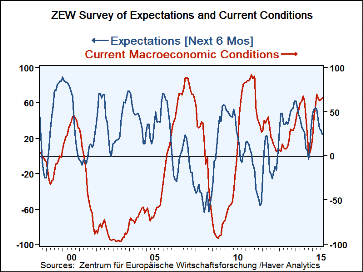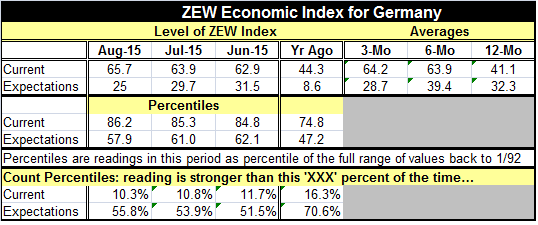 Global| Aug 11 2015
Global| Aug 11 2015ZEW Expectations Continue to Lag
Summary
The ZEW current index continued its slow slog higher in August as expectations backtracked. Expectations are below their historic midpoint as they are higher fully 55.8% of the time, thus lower about 45% of the time. The current index [...]
 The ZEW current index continued its slow slog higher in August as expectations backtracked. Expectations are below their historic midpoint as they are higher fully 55.8% of the time, thus lower about 45% of the time. The current index has snaked higher and is higher than its august level only 10.3% of the time making the current assessment quite strong and impressive. Both the current and the expectations indices are up strongly from their year-ago readings.
The ZEW current index continued its slow slog higher in August as expectations backtracked. Expectations are below their historic midpoint as they are higher fully 55.8% of the time, thus lower about 45% of the time. The current index has snaked higher and is higher than its august level only 10.3% of the time making the current assessment quite strong and impressive. Both the current and the expectations indices are up strongly from their year-ago readings.
The index shows the German economy to be quite impressively strong but also reveals some equivocation about the future.
Both stock and bond expectations hover around the middle of the historic assessments made by the ZEW Financial experts. Stock profitability is a positive expectation; however, for bonds, the expectation is negative.
Of course, we will see how much all this changes when markets get a chance to react to the new touted agreement with Greece. The early information on the new deal is lacking. However, as the IMF is reported to be `in' yet, there is no mention of the debt reduction that the IMF board of directors said would have to be a part of any Greek deal if the IMF were going to participate. Questions linger.
So with Greece we continue to take what looks like a step forward but may turn out to be a step back. The German negotiators seem to have lost some of their aggressive edge. And some of the most controversial aspects of the debt deal are not being reported on. Time will tell as the details of the deal will eventually be known and we'll see who in the EMU is on board when the dust clears.

Robert Brusca
AuthorMore in Author Profile »Robert A. Brusca is Chief Economist of Fact and Opinion Economics, a consulting firm he founded in Manhattan. He has been an economist on Wall Street for over 25 years. He has visited central banking and large institutional clients in over 30 countries in his career as an economist. Mr. Brusca was a Divisional Research Chief at the Federal Reserve Bank of NY (Chief of the International Financial markets Division), a Fed Watcher at Irving Trust and Chief Economist at Nikko Securities International. He is widely quoted and appears in various media. Mr. Brusca holds an MA and Ph.D. in economics from Michigan State University and a BA in Economics from the University of Michigan. His research pursues his strong interests in non aligned policy economics as well as international economics. FAO Economics’ research targets investors to assist them in making better investment decisions in stocks, bonds and in a variety of international assets. The company does not manage money and has no conflicts in giving economic advice.
More Economy in Brief
 Global| Feb 05 2026
Global| Feb 05 2026Charts of the Week: Balanced Policy, Resilient Data and AI Narratives
by:Andrew Cates






